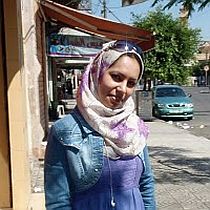


CoPro, Storydoc and Ramallah.doc

To make a follow-up on the text above, it goes without saying that this reality, well not for a traveller like me, but for a Palestinian like the taxi driver, for someone who lives in the West Bank, for someone who has no permission to travel freely in Israel, not to talk about the conditions for those who live in a Gaza that is completely isolated – that this is – with a very stupid German expression – gefundenes Fressen for any committed documentarian, Israeli or Palestinian. There were strong human stories from both sides, there were character driven stories, conflict after conflict, a lot of tension in the verbal, written and visual pitches, rough material to be shown. In the workshop in Ramallah and at the individual meetings in Tel Aviv.
But maybe not so many original approaches, call it creative treatments. There is, one feels, a now-or-never feeling of impatience connected to many stories. Many filmmakers or filmmakers-to-be, both Israelis and Palestinians. come from the News. They are used to the saying – we have to get it out NOW, and think less about the aesthetics. Fair enough, some stories have to go out now but actuality and little time mean less creative thinking, and less sense for the detail and for eventual other layers that can be taken out from a story. To say it in a less polite way – we can not keep on watching Israeli soldiers beating the shit out of Palestinians. Or keep on watching victims of suicide bombers. We need distance to the events, analysis, breathing, other approaches. The camera leaves often far too early a face instead of staying and wait for more from a scene, to interpret the pauses, to let a narrative breathe.
Learn from Leacock and his magic moments. Learn from Herz Frank and his emotional analysis.
Both workshops, the CoPro and the Storydoc, are described below and through their websites.
Photo: Nagham Mohanna, who last year presented “Romance in Gaza” at ramallah.doc and took part in the Storydoc sessions. She and her project are now at the Documentary Campus 2011.